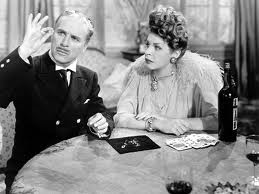Monsieur Verdoux

Am I the only one who thinks Monsieur Verdoux is overblown and overrated? When it was first released in 1947, there was no way it could be fairly judged critically; Chaplin’s reputation as a supposed philanderer and Communist gave him and his movie no chance in the public court. Then the movie was re-released in 1964 and 1972, and a world that had had to suffer through the scare of The Bomb and the relentlessness of the Vietnam War was all too eager to embrace its black comedy.
Yet the primary problem with Verdoux is that everyone salutes its intentions rather than its execution. We are told that Verdoux (played, of course, by Chaplin) was a bank clerk who lost his job in the Great Depression. Then, in order to support his invalid wife and young son, Verdoux began a double life, wooing and marrying rich women, murdering them, covering his tracks, and snatching their fortunes.
And that’s the problem: Throughout most of the movie, we’re told everything rather than having it shown to us. The movie begins with a shot of Verdoux’s tombstone, followed by Verdoux’s off-screen voice hurriedly starting his narration of the story, as if Chaplin had such a whopper of a tale on his hands that he couldn’t wait to get started. (For all of the movie's ballyhooed black comedy, Chaplin doesn't even have the wit to use his beyond-the-grave narration as a gag, as director Billy Wilder would do with William Holden in Sunset Boulevard [1950]).
Then we get a real lulu of an exposition: a few loud minutes of the Couvais family, whom we’re told are vintners but bicker like the cast of a white-trash reality TV show. It seems that a member of their family was taken in by Verdoux’s winning ways, and why did she clean out her bank account and then suddenly disappear?
The answer lies in Verdoux’s outdoor incinerator, which annoys his female neighbors because the smoke won’t allow them to hang out their laundry, but they’re too charmed by Verdoux to complain. And there’s Verdoux tending his garden, nearly stepping on a caterpillar and then moving it to a safe place. He cares for the life of a small creature but not a human being. Ah, the irony!
And therein lies the other main problem with the movie: In a story where woman after woman is being knocked off, it’s all about how Verdoux feels. Upon his first meeting with Madame Grosnay (Isobel Elsom), Verdoux falls all over himself (literally – and her as well) trying to convince us what a mesmerizing lover he is, and it gets to be pretty embarrassing to watch. When Verdoux wants to try out a new poison, he picks up a lonely woman (Marilyn Nash) off the street. At Verdoux’s apartment, they have an endlessly dreary philosophical conversation that, nevertheless, charms Verdoux so much that he decides not to poison her (the old softie!).
Nash, by the way, is beautiful but wooden, and the latter adjective applies to most of the cast. In fact, the only time the movie brightens up and is about something other than Verdoux and his wonderfulness is when Martha Raye blasts onto the screen. As Annabelle, Verdoux’s erstwhile murder victim who never realizes how lucky she really is, Raye cuts through the movie’s pretentiousness and gives it the black-comedy liveliness it aimed for all along. (Apparently, Raye was just as brash in real life, referring to Chaplin on the set as “Chuck” and miraculously getting away with it.) Other than Raye and a dryly humorous scene between Chaplin and William Frawley (four years before he attained TV immortality in “I Love Lucy”), the rest of the cast is dull as dishwater.
Finally, there’s the movie’s infamous wrap-up, in which Chaplin/Verdoux scores points off every nearby target. At his court sentencing, Verdoux gives an eye-rolling speech in which he compares his own killings with those of wars and declares himself “an amateur” by comparison. (But if he really believes he’s an amateur, why bring up the point at all?) Verdoux continues his smugness right to the end, trading barbs with a reporter (Herb Vigran, later a very recognizable TV character actor) and even the priest who has come to perform Verdoux’s last rites. Chaplin presents Verdoux as completely sound and rational, even as he has the last word over God.
Over the years, many critics and moviegoers have criticized this movie for its antiquated cinematic “vocabulary” (the constant shot of train wheels to symbolize scene changes, etc.). None of that would matter if the story and characters were more compelling. Even more than its follow-up Limelight, Monsieur Verdoux is Chaplin at his most verbose and smugly superior – even when he’s portraying a sociopathic murderer.
Click here to return to:
HomepageFilmography